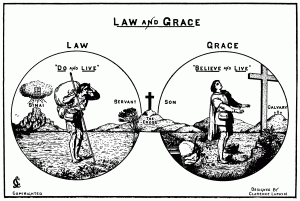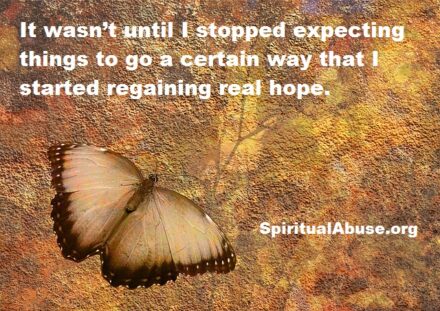I have been absent for some time in my writing trying to sort out the real motivations and purposes behind this blog. There is an internal conversation that asks, should I continue focusing on legalism, cult-style control within religious organizations? Or should I turn the focus towards grace, and love, and freedom in Christ?
Then events take place that remind me, grace, love, and freedom in Christ, comes from the awakening the understanding that the yoke of legalism is ugly, destructive, and anti-Christ, and my resolve is rekindled.
Thus, I want to ask you the dual questions; Are you taught (or are you teaching) to keep the law of Moses?
Legalism. It is the way of a theocracy or dictatorship. Undoubtedly, if we believe Scripture, we believe His method in the latter Old Testament was just this, a theocracy, a system of strict rule that consisted of a Law Giver (Moses), a Judge (priesthood) and Executioner (zealots). In modern day religious structures that use the Law to demand obedience to ordinances, these three, the Law Giver, The Judge and the Executioner is known as Pastor.
And yet the author of all of this, God, blotted out the written ordinances of the Law, it’s demands, requirements and judgements, with the fulfilling of Scripture, in Christ on the Cross.
Blotting out the handwriting of ordinances that was against us, which was contrary to us, and took it out of the way, nailing it to his cross; – Colossians 2:14, KJV
I thank God that some time ago, through study, prayer, seeking and sometimes, just silence, I was able to come to the realization that modern day men who yoke congregants with the demands of the Law of Moses are NOT fulfilling the Law of Christ, and thus, I wanted no part with them.
Consider this illustration and the following Scriptural backing;

Act 15:5 But there rose up certain of the sect of the Pharisees which believed, saying, That it was needful to circumcise them, and to command them to keep the law of Moses.
Act 15:10 Now therefore why tempt ye God, to put a yoke upon the neck of the disciples, which neither our fathers nor we were able to bear? Act 15:11 But we believe that through the grace of the Lord Jesus Christ we shall be saved, even as they.
Act 15:24 Forasmuch as we have heard, that certain which went out from us have troubled you with words, subverting your souls, saying, Ye must be circumcised, and keep the law: to whom we gave no such commandment:
Act 15:28 For it seemed good to the Holy Ghost, and to us, to lay upon you no greater burden than these necessary things; Act 15:29 That ye abstain from meats offered to idols, and from blood, and from things strangled, and from fornication: from which if ye keep yourselves, ye shall do well. Fare ye well.
The law was a very heavy burden, it was a yoke, and as described in Acts 15, it was something that not even the current Church elders (who were Jewish) and their fathers (all of Judaism under the law) could really and truly bear. Furthermore, it was fulfilled in the Law of Christ, His sacrifice was the final atonement of the Law.
Then the question was asked, ‘Why do you tempt (displease) God, to place requirements upon His believers?’
Jesus, much earlier, in Matthew 23, made a bold proclamation to his Apostles about how they would go forth in creating disciples, or more importantly, how not to, and it bears much weight in this conversation.
Mat 23:2 Saying, The scribes and the Pharisees sit in Moses’ seat:
Mat 23:4 For they bind heavy burdens and grievous to be borne, and lay them on men’s shoulders; but they themselves will not move them with one of their fingers.
Mat 23:6 And love the uppermost rooms at feasts, and the chief seats in the synagogues, Mat 23:7 And greetings in the markets, and to be called of men, Rabbi, Rabbi. Mat 23:8 But be not ye called Rabbi: for one is your Master, even Christ; and all ye are brethren. Mat 23:9 And call no man your father upon the earth: for one is your Father, which is in heaven. Mat 23:10 Neither be ye called masters: for one is your Master, even Christ.
It seems strange to me, then, that modern day pastors would crave the Seat of Moses (Law Giver, Judge of the Law and Executioner), which is Authority, absolute authority. It is no surprise, that when you crave such authority, the Law is your backdrop and story.
Granted, the experiences of which I speak are related to Oneness Pentecostal churches, or the United Pentecostal Church International. But as I share my story, and hear from many others, it is not privy just to that denomination. This takes place on a grand scale.
For instance, some of the laws of which I speak are quite contrary to Christ’s teaching, and yet they exist in many religious circles, such as;
- The pastor dictates what clothes men and women can wear
- The pastor dictates if men can have facial hair, or either sex can wear jewelry
- The pastor controls who/if you can date or marry
- The pastor controls if/when you can come to church
This is a very, very brief list, and it encompasses so many aspects of congregants lives, such as what music you are allowed to hear, whether or not you can attend plays, dances, watch television, or movies, etc.
None of these tend to be supported in Scripture, unless you purchase the idea that the Pastor is God’s delegated authority (Moses) on the earth, and in him/her [pastor] is vested the authority to bind their own commandments as doctrines of the Church.
The only problem is, Jesus condemned this openly;
Mar 7:7 Howbeit in vain do they worship me, teaching for doctrines the commandments of men.
Often times, those religious dictators that would exercise authority and control over others, start with the backdrop of utilizing the Law of Moses as the vehicle of their control, but so often inject their own ideals, commandments and laws into the mix.
So what is the Law of Moses?
This is far too long a topic to address properly, but there is a very simple Scripture (it always does the best job!) that gives you the in a nutshell version;
Col 2:20 Wherefore if ye be dead with Christ from the rudiments of the world, why, as though living in the world, are ye subject to ordinances,
Col 2:21 (Touch not; taste not; handle not;
Col 2:22 Which all are to perish with the using;) after the commandments and doctrines of men?
Suffice it to say, that if you are being taught, or God forbid, you are teaching, that one must keep the rudiments, precepts, and ordinances of Old Testament Law, in order to obtain Grace, and to be Saved, it is anti-Christ.
Dress codes and standards, were Old Testament law. (Dresses only for women to be saved)
Tithing is old testament law. (Must give man 10%+ of all income to be saved)
Absolute authority in one human is old testament law. (Blind obedience to be saved)
Obedience to Christ is New Testament Law!
Gal 6:2 Bear ye one another’s burdens, and so fulfil the law of Christ.
Mar 12:29 Jesus answered, “The most important is, ‘Hear, O Israel, the Lord our God is one Lord,
Mar 12:30 and you must love the Lord your God with all your heart, with all your soul, with all your mind, and with all your strength.’
Mar 12:31 The second is this: ‘You must love your neighbor as yourself.’ No other commandment is greater than these.”
Thus, if ANYONE comes preaching any other Gospel (Law), let him be accursed! The only Gospel is Christ, and Him Crucified! The only Gospel is the Law (Love) of Christ and the redemption we have in Him, through the Cross.
Anyone that teaches ordinances and obedience (always obedience to the teacher of the law) in order to obtain Christ’s grace and mercy is a false teacher, and is harmful to your faith, your future, and yes, your family! I pray you go forth in the Law of Christ, and let no one steer you aside from His Commandments of Love.
1Jn 2:25 The message that the Son himself declared to us is eternal life.
1Jn 2:26 I have written to you about those who are trying to deceive you.
1Jn 2:27 The anointing you received from God abides in you, and you do not need anyone to teach you this. Instead, because God’s anointing teaches you about everything and is true and not a lie, abide in him, as he taught you to do.
********
Shop at our Amazon store! As an Amazon Influencer, this website earns from qualifying purchases.




